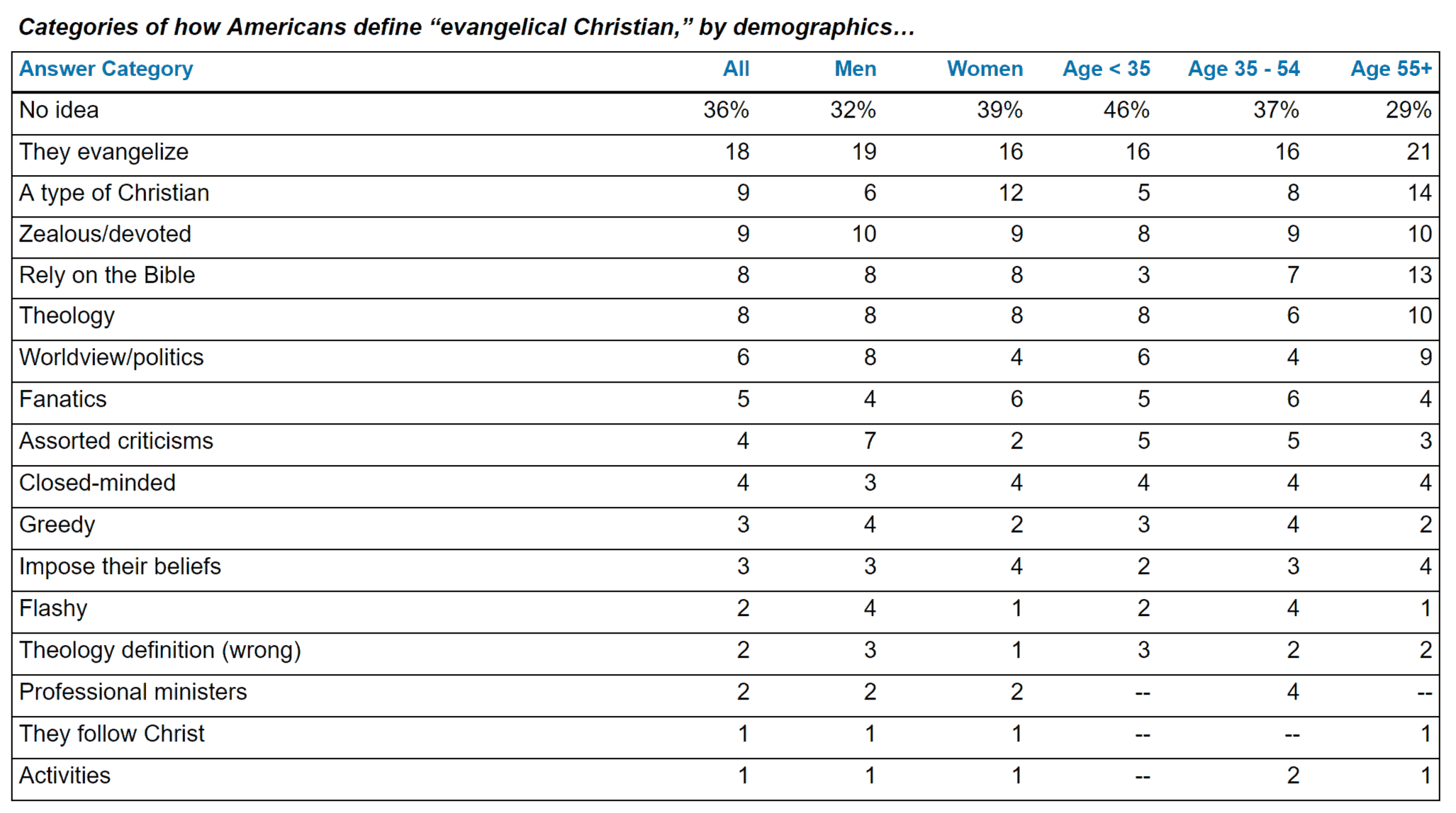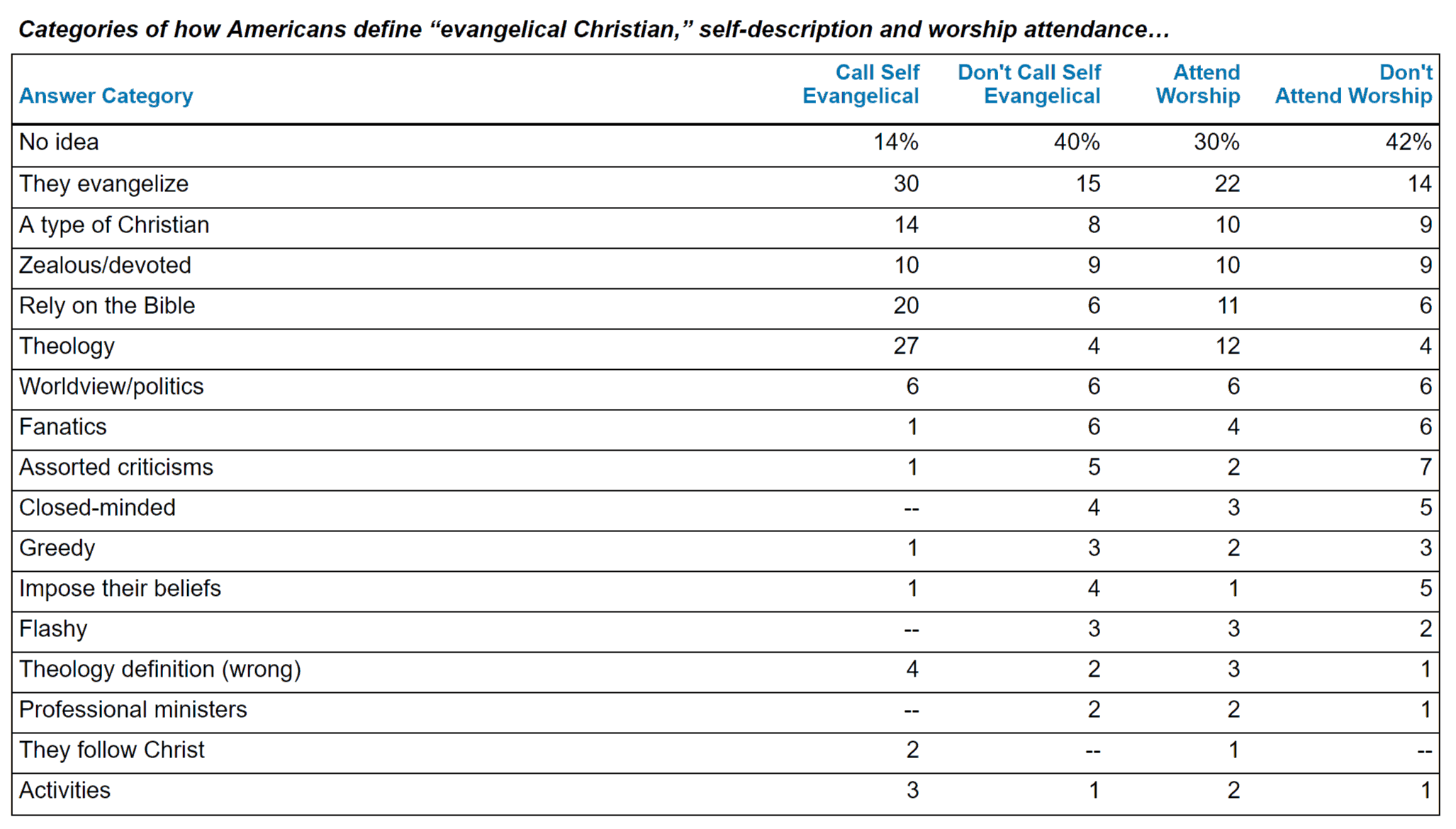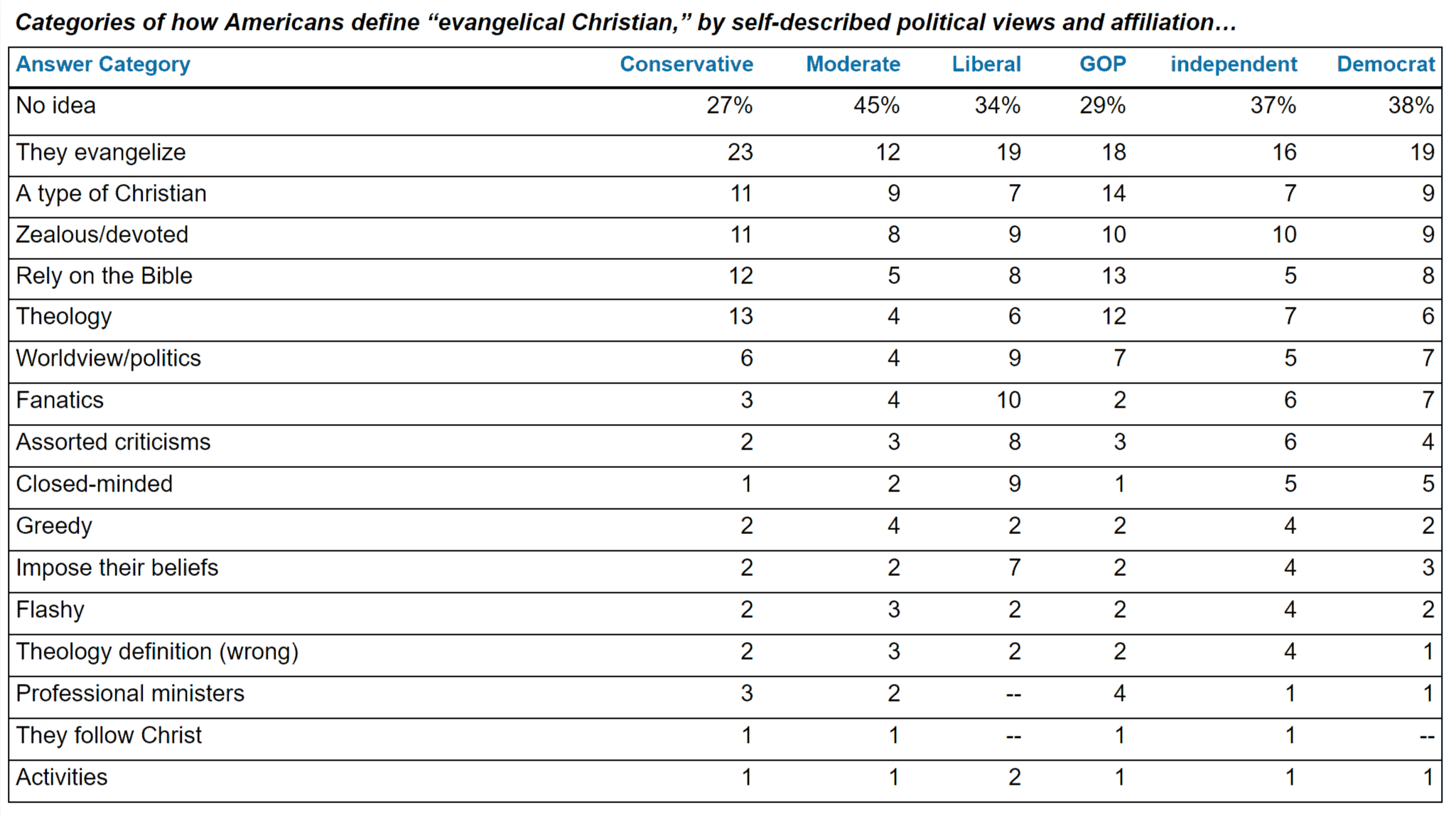Almost half of all Americans don’t really know what an “Evangelical Christian” is, and the rest generally can’t agree on a definition
(Original release date: September 2, 2008) A new report released from Grey Matter Research & Consulting (formerly Ellison Research) of Phoenix, Arizona shows that even though evangelical Christians are a group that gets a lot of attention from journalists, marketers, and politicians, it’s a group that most Americans struggle to define – and many admit they don’t have the slightest clue what an evangelical actually is.
The findings are from a Grey Matter Research report titled “America’s Definition: What Is an Evangelical?” The study was independently designed, funded, and conducted by Grey Matter Research among a representative sample of over 1,000 American adults. Grey Matter Research is a full-service marketing research firm.
The study asked Americans to define in their own words just what an “evangelical Christian” actually is. For starters, 36% of all Americans say they have no idea at all what an evangelical Christian is. They could not even hazard a guess as to what defines an evangelical.
The most common perception is that evangelicals are Christians who place a special emphasis on spreading their faith to other people. Sometimes this is phrased in a negative light (the word “proselytizing” comes up frequently), and sometimes in a neutral or positive light (e.g. “spreading their faith,” “telling others about Jesus,” or “evangelizing others”).
No other response category accounts for even one out of every ten answers. Nine percent say evangelicals are just a specific type of Christian, such as a non-denominational Christian, a born-again Christian, or a Protestant Christian. Another 9% believe evangelicals are Christians who are particularly zealous or devoted to their faith.
Eight percent feel evangelicals are defined largely by their focus on the Bible: their reliance on it, their belief in it, and/or their more literal interpretation of it. Another 8% have some sort of specific theological definition of what an evangelical is: they are saved by grace, they believe in a born-again religious experience, they believe in eternal life through Christ, etc.
Only 6% define evangelicals by their worldview or politics, even though evangelicals are often discussed in the public arena in a political context.
After this category, things become particularly fragmented and often sharply critical. Five percent say evangelicals are not just devoted or zealous, but are actually defined by fanaticism. Four percent don’t really have any specific definition, but make highly critical (and often quite ugly) characterizations: that evangelicals are racist, stupid, hate-filled, illiterate, etc. Another 4% believe they are defined by being completely closed-minded. Three percent define evangelicals as being greedy or entirely focused on money, and 3% say part of what defines an evangelical is their drive to impose their beliefs on other people.
There are other definitions held by small numbers of Americans: that evangelicals are flashy or showy, that they are ministry professionals (confusing the terms “evangelical” and “evangelist”), that they are defined by activities such as attending church or Bible study, that they attempt to follow Christ, and even some extremely off-base theological definitions, such as the belief that evangelicals closely follow the Torah or that they are a type of Mormon.
Throughout all of the individual definitions, there are a number of broader themes revealed by the research. One is that only 56% of all Americans can give any sort of substantive definition of “evangelical,” beyond a simple “I don’t know” or just criticism or invective. Keep in mind that this 56% includes people who are way off in their definitions, such as saying evangelicals are particularly strict Catholics or that they worship angels. The other 44% – almost half of all Americans – have no substantive perception at all of what an evangelical Christian actually is.
Another broad theme is that there is almost no consensus among Americans as to what evangelicals are, even though this population is so frequently discussed. Evangelicals are variously defined by their activities, their theology, their politics, their level of devotion, their view of the Bible, their efforts to tell others about their faith, their style – but none of these definitions is embraced by even one out of every five Americans. Almost half of Americans have no real clue what an evangelical is, and those who do have some definition of the term usually can’t agree on that definition.
This even includes members of the evangelical community. In this study, 11% of all Americans called themselves “evangelical Christians.” Among those who did, 14% later admitted in the study that they actually have no idea just what an evangelical is. And 28% of the people who regularly attend a church that is generally considered to be part of an evangelical denomination say they do not have any guess as to what an evangelical is.
Definitions of “evangelical” vary some by age, gender, religious involvement, and religious perspective, but the greatest variation is by political affiliation. Self-described political moderates are especially unlikely to have any clue what an evangelical is, while political liberals are particularly likely to have disapproving comments about this group.
Liberals are nine times as likely as conservatives to define evangelicals as being closed-minded, more than three times as likely to feel they are fanatics, four times as likely to level assorted criticisms at them (e.g. that they’re stupid or racist), and over three times as likely to say they are defined by their drive to impose their beliefs on others.
Political conservatives, on the other hand, much less frequently level harsh criticisms at evangelicals, and more frequently define evangelicals according to things such as their theology, their evangelistic efforts, or their focus on the Bible.
Ron Sellers, president of Grey Matter Research, noted that one of the surprises of the study is how much abuse is aimed at evangelicals. “Some people used language in describing evangelical Christians that we can’t even reprint in the report,” Sellers said. “Evangelicals were called illiterate, greedy, psychos, racist, stupid, narrow-minded, bigots, idiots, fanatics, nut cases, screaming loons, delusional, simpletons, pompous, morons, cruel, nitwits, and freaks, and that’s just a partial list. The insults and anger directed at this population group by a surprisingly large proportion of Americans was truly shocking. Some people don’t have any idea what evangelicals actually are or what they believe – they just know they can’t stand evangelicals, whatever they might be.”
Sellers pointed out that as much popular attention as evangelicals receive, there’s little understanding among Americans about just what an evangelical is. “Evangelicals are defined every which way, and that is among the people who even attempted to define them. When the media reports something about ‘evangelical leaders’ like Rick Warren or James Dobson, or describes a political candidate as meeting with an evangelical group, or polls likely voters and reports that evangelicals are backing a particular candidate, many Americans honestly don’t have the faintest notion of just who belongs to that group that is being described, while others are completely off-base in their assumptions of who the report is describing,” Sellers explained.
He also noted that other studies by Grey Matter Research have shown that only 35% of all Americans believe they know someone very well who is an evangelical, while 51% don’t personally know any evangelicals even casually. Sellers added, “Americans are less likely to know an evangelical Christian than they are to know a Jewish person, an American Indian, an Asian person, or a gay or lesbian person – all of whom represent populations that are considerably smaller than the evangelical population in this country, no matter how it is defined.”
One thing that proved to be a bit surprising to the researchers was how few people specifically define evangelicals according to their politics or worldview. “Especially during election time, we often hear about evangelicals in connection with candidates, or with political or social issues. Yet Americans usually don’t define ‘evangelicals’ by their voting habits or politics. There’s at least some basic understanding among the American population that evangelicals are defined by religion rather than by politics, even if many people don’t really know just what that religious definition is,” Sellers commented.
Actual Quotes:
A selection of actual quotes from study participants can be found in the full report. A small sample of these is below:
- “A believer in Jesus Christ that communicates their belief and faith in Jesus with others. They share the good news about Jesus with others who may not know or believe in Jesus.”
- “A narrow-minded Bible-thumping simpleton.”
- “Evangelical Christianity is what can be referred to as ‘Showbiz Christianity.’ It’s all smoke and mirrors more focused on the collection plate than spirituality.”
- “I haven’t the foggiest idea.”
- “People who use the Bible as either their sole source, or major source, of religious and moral guidance.”
- “Evangelicals are Protestants that have decided that nobody, anywhere, should be having any more fun than they are, and use literal interpretations of scripture to support their position. Evangelicals feel that it is not possible for someone to gain admittance to heaven unless you believe exactly what they do.”
- “One who believes that the Bible is the absolute word of God and who believes that ‘salvation’ is reserved only for those who accept Jesus as their personal savior.”
- “A right-wing, conservative, non-Catholic with a political agenda and an intolerance of anyone/thing that disagrees, with a desire to impose their beliefs on every aspect of life and everyone’s life too.”
- “Very spiritual Christ-followers with a narrow view of religion and its relation to life; possibly including literal interpretations of the Bible. Very prone to proselytize their faith, but in a good way.”
- “A charismatic Christian, not afraid to worship raising hands in the air and/or clapping to more upbeat worship music.”
- “Fanatic, wants to impose religious law on others who do not share those beliefs. Wants to forcibly convert non-believers and subject those who refuse to penalties.”
Study Details:
The study was conducted by Grey Matter Research & Consulting (formerly Ellison Research), a marketing research company located in Phoenix, Arizona. The sample of 1,007 adults is accurate to within ±3.1 percentage points at the 95 percent confidence level with a 50 percent response distribution.
The study was conducted in all 50 states. Respondents’ age, household income, geography, racial or ethnic background, and gender were carefully tracked to ensure appropriate representation and accuracy.
The researchers took the individual answers from survey participants and grouped them into categories, by content. For instance, an answer of “They are always in church” and another of “They go to church a lot” would be grouped into the same category (frequent church attendance).
Many responses had multiple themes and fit multiple categories; for instance, a response of “They are Christians who base their lives on a literal interpretation of the Bible and are very active in conservative politics” would not be forced into one category but would be placed into multiple categories based on the individual elements of the definition. For this reason, the response categories add up to more than 100%.



